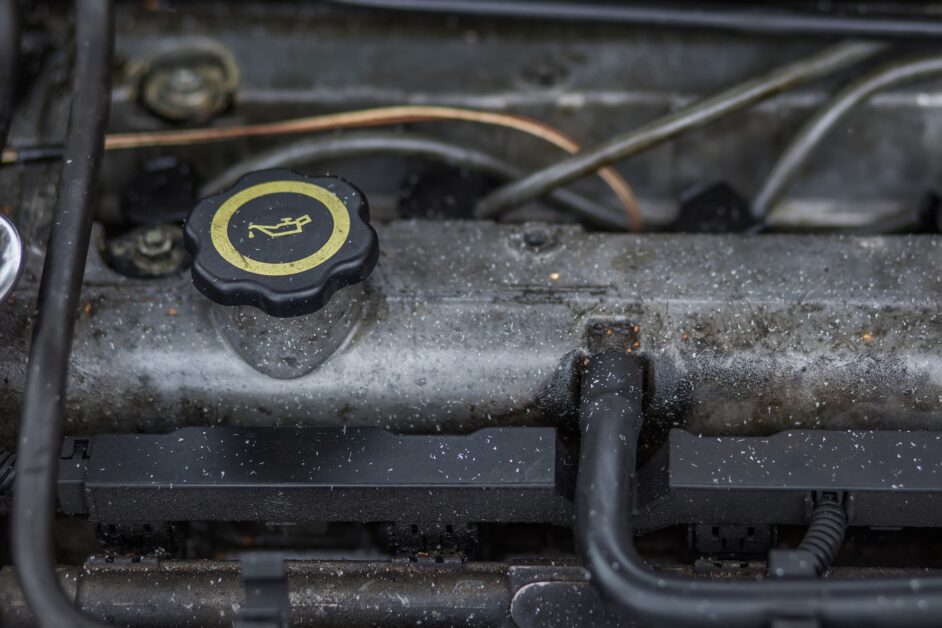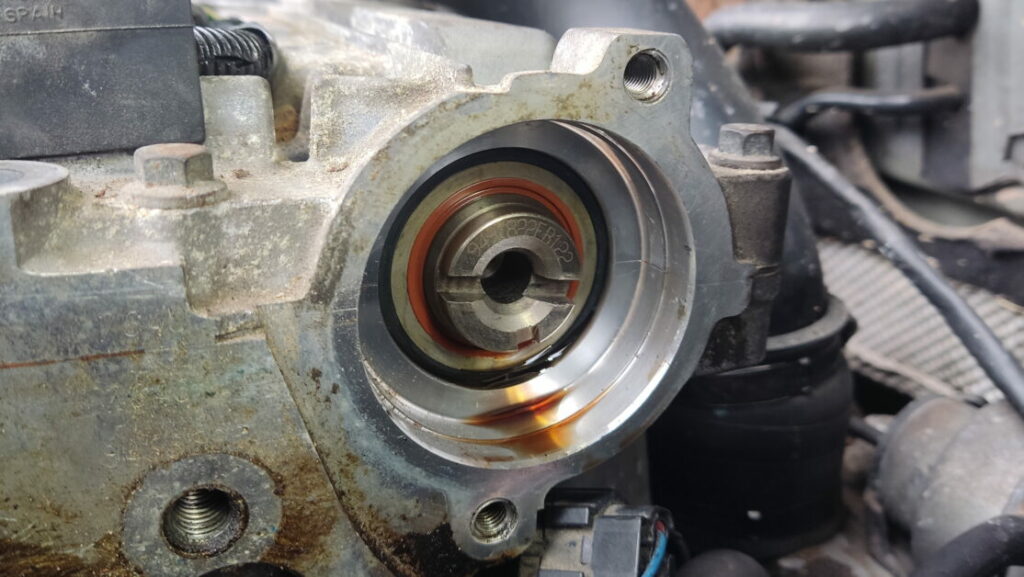When it comes to car maintenance, few topics cause as much debate as oil changes. One of the most often asked questions that we get asked by readers is whether or not it’s a good idea to switch to synthetic oil after 100,000 miles.
Now, it’s easy to see where the confusion comes from. There are a lot of forum posts and articles out there claiming that switching to synthetic oil will create oil leaks or even destroy the engine.
Potential Risks of Switching to Synthetic Motor Oil on an Older Car
Before we answer the main question, let’s first go over some of the potential risks of making the switch to synthetic motor oil on an older car.
The only real problem with full synthetic oil is that it’s incredibly good at preventing sludge formation and even flushing out sludge. For regular cars who used synthetic oil before, that’s a great thing, as it will keep the engine clean.

However, for old cars that have already accumulated a lot of sludge over the years due to neglected oil changes, switching to full synthetic oil can cause all that sludge to suddenly get flushed out and clog up the oil galley and even the oil jets. In extreme cases, this can cause engine damage as the oil can’t circulate properly anymore.
But how common and likely is this to happen? We asked a few experts and they all said that while it is a possibility, it’s extremely rare. It usually only happens in cases where the car has been horribly neglected for a very long time and the sludge build-up is extremely bad. Personally, we’ve never seen this happen.
Lastly, let’s talk about the oil leaks. People often say that switching to synthetic oil will cause oil leaks in older cars, but is there any truth to this?
Well, the answer is a bit complicated. Synthetic oil can expose existing oil leaks by flushing out the gunk that’s been sealing the leak. So if your car has old and brittle seals, chances are that they might start leaking after you switch to synthetic oil.
On the other hand, if your car doesn’t have any oil leaks, switching to synthetic oil will not create any new ones.
Is Switching to Synthetic Oil After 100K Miles Safe?
Now that we’ve gone over some of the potential risks and cleared things up, let’s get back to the main question
The answer is yes, switching to synthetic oil after 100,000 is safe in most cases, and it’s very unlikely to cause you any problems. If your car is in relatively good condition and you’ve been keeping up with the oil changes on time as recommended by the manufacturer, then synthetic oil will only improve things. Furthermore, 100,000 is really not that high of a mileage for today’s standards, and many cars can easily go twice as far without any problems.
However, if the car has been seriously neglected, and you’re suspecting that there’s a lot of sludge build-up, then we would recommend taking it easy and switching to a synthetic blend first, and then if everything goes well, you can make the switch to full synthetic oil.

Another thing to keep in mind is that synthetic oil can indeed expose existing leaks that have been previously sealed with sludge. Keep in mind that this can get expensive if the engine’s main seals start leaking oil, so if you’re not in the right place financially, it might be a better idea to continue using the same conventional oil.
That, or you can use full synthetic oil that’s specifically designed for high mileage engines. These types of engine oils contain special additives that swell up old seals and help prevent new leaks from forming.
What to Expect After Switching to Synthetic Oil for the First Time
Now that we’ve got that out of the way, let’s talk about what you can expect after making the switch to synthetic oil for the first time.
1. The Engine Will Run Smoother and Quieter
In a lot of cases, you won’t notice a huge difference, at least until the second full synthetic oil change. If the car is really gunked up inside the engine, the first oil change might not make much of a difference as it will only loosen up all of the sludge and other deposits. You can and should expect the engine to run smoother, especially at cold temperatures.
However, with the second full synthetic oil change, all of the nasty gunk and sludge will have been flushed out, and you should really notice a difference in how the engine feels. It will be smoother, quieter, and might even produce more power since the internal drag has been reduced.
2. Next Oil Change Should Be Sooner
Since the first oil change will dissolve and loosen up a lot of the contaminants and sludge, we highly advise you to do the second full synthetic oil change sooner.
If the car has been neglected before, then ideally, you do not want all of the sludge, soot, and other particles to end up in the oil filter and clog it up, so changing the oil sooner will help avoid that.
3. The Engine Might Develop Oil Leaks
With that said, you can also expect some negative side effects after making the switch to synthetic oil for the first time. The first and most common (although VERY rare) is that the engine might develop oil leaks.
We’ve mentioned this at the beginning of the article, but it’s worth repeating. Synthetic oil can expose existing leaks that have been previously sealed with sludge.
After you’ve switched to full synthetic oil, make sure to take a peak under the engine and look for any new oil leaks. Also, whatever you do, do not use any stop-leak oil additives!
Apart from that, that’s really it. There are no other negative side effects that you should be worried about when switching to synthetic oil after 100,000 miles.
Final Thoughts
In conclusion, if you’ve been using conventional oil up until the 100,000-mile mark, then we highly recommend making the switch to synthetic oil. It’s extremely unlikely to cause any problems to your car, especially considering that the 100,000-mile mark is nothing to most cars these days.
Full synthetic oil is better in every single way (except price) when compared to conventional oil, so there’s really no reason not to switch. Just make sure to do your research and pick the right synthetic oil for your car.
If you’re not sure which oil to get, then check out these articles for more help:
Best Oil for Turbo Diesel Engines

Eddie is the co-founder of CarCareCamp.com, and the site’s primary contributor.
Under his belt, Eddie has a bachelor’s degree in Automotive Electronics Engineering and almost a decade of experience working as a semi-truck technician (specializing in electrics).
